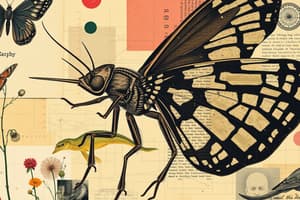Podcast
Questions and Answers
What is the term for any living thing?
What is the term for any living thing?
- Bacteria
- Classification
- Taxonomy
- Organism (correct)
Which of the following describes multicellular organisms?
Which of the following describes multicellular organisms?
- Can move freely
- Always larger than one-celled organisms
- Made up of many cells (correct)
- Made up of one cell
What is the process of organizing living things into groups according to their similarities?
What is the process of organizing living things into groups according to their similarities?
- Taxonomy
- Biodiversity
- Microscopy
- Classification (correct)
Who developed the two-part scientific naming system?
Who developed the two-part scientific naming system?
What are the seven taxonomic levels in order from largest to smallest?
What are the seven taxonomic levels in order from largest to smallest?
What type of organisms make up the Plant Kingdom?
What type of organisms make up the Plant Kingdom?
What is a characteristic of organisms in the Animal Kingdom?
What is a characteristic of organisms in the Animal Kingdom?
What type of organisms are found in the Monera/Bacteria Kingdom?
What type of organisms are found in the Monera/Bacteria Kingdom?
Which of the following best describes Fungi?
Which of the following best describes Fungi?
What defines a species?
What defines a species?
The three shapes of bacteria are: Rod shaped, Ball shaped, and __________.
The three shapes of bacteria are: Rod shaped, Ball shaped, and __________.
How do algae, a type of protist, obtain their food?
How do algae, a type of protist, obtain their food?
What defines the classification of humans?
What defines the classification of humans?
What did scientists learn about classification in the 1600s?
What did scientists learn about classification in the 1600s?
Study Notes
Basic Organism Definitions
- Organism: Any living thing.
- Multicellular: Composed of many cells, usually larger organisms with various bodily functions for survival.
- One-Celled or Single-Celled: Consists of a single cell, typically smaller organisms with fewer functions necessary for survival.
Classification Concepts
- Classification: Organizing living things into groups based on similarities.
- Taxonomy: The scientific study of classifying living organisms.
- Binomial Nomenclature: Two-part scientific naming system consisting of genus and species names, developed by Carolus Linnaeus.
Classification Hierarchy
- Classification involves seven taxon levels from largest to smallest:
- Kingdom
- Phylum
- Class
- Order
- Family
- Genus
- Species
Kingdoms of Life
- Plant Kingdom: Multicellular organisms that obtain energy through photosynthesis (e.g., trees).
- Animal Kingdom: Multicellular, mobile organisms that consume other living beings (e.g., fish).
- Monera/Bacteria Kingdom: Unicellular organisms without a nucleus, crucially abundant on Earth (e.g., bacteria).
- Protist Kingdom: Includes both unicellular and multicellular organisms with varied modes of nutrition (e.g., algae and amoeba).
- Fungi Kingdom: Multicellular, non-moving organisms that absorb nutrients from other organisms (e.g., mushrooms).
Characteristics of Living Organisms
- Genus: A classification level that groups similar organisms (e.g., dogs and wolves).
- Species: The smallest classification unit, representing one specific organism.
- Microscope: A tool used to magnify tiny organisms for study.
Distinctive Features of Groups
- Bacteria Shapes: Includes rod-shaped, ball-shaped, and spiral-shaped categories.
- Types of Protists:
- Algae: Plant-like and photosynthetic organisms.
- Protozoans: Animal-like, often motile and acquire nutrients from environment or prey.
- Fungi Types: Includes molds, mushrooms, and sac-fungi.
- Plants: Multi-celled organisms containing chloroplasts for photosynthesis (e.g., trees, flowers).
- Animals: Multi-celled, energy-acquiring organisms that feed on others (e.g., mammals, fish).
Classifying Organisms
- Classifying: Grouping organisms based on similarities to enhance understanding and relationships.
- Changing Ideas About Classification: Development of microscopes in the 1600s allowed discovery of new organisms and subsequent revisions in classification.
Human Classification
- Classification of Humans:
- Kingdom: Animalia
- Phylum: Chordata
- Class: Mammalia
- Order: Primates
- Family: Hominidae
- Genus: Homo
- Species: Sapiens
Example Classification of Monkeys
- Classification of Monkey:
- Kingdom: Animalia
- Phylum: Chordata
- Class: Mammalia
- Order: Primates
- Family: Cercopithecidae
- Genus: Macara
- Species: Sylvanus
Additional Facts
- Bristlecone Pine Tree: Known as the oldest living tree, estimated to be 4,900 years old, predating the first Egyptian pyramid construction. Found in Nevada.
Studying That Suits You
Use AI to generate personalized quizzes and flashcards to suit your learning preferences.
Description
Test your knowledge of important vocabulary in biology related to organisms and their classification. This quiz focuses on key terms such as 'organism', 'multicellular', and 'single-celled'. Perfect for students looking to reinforce their understanding of biological concepts.




